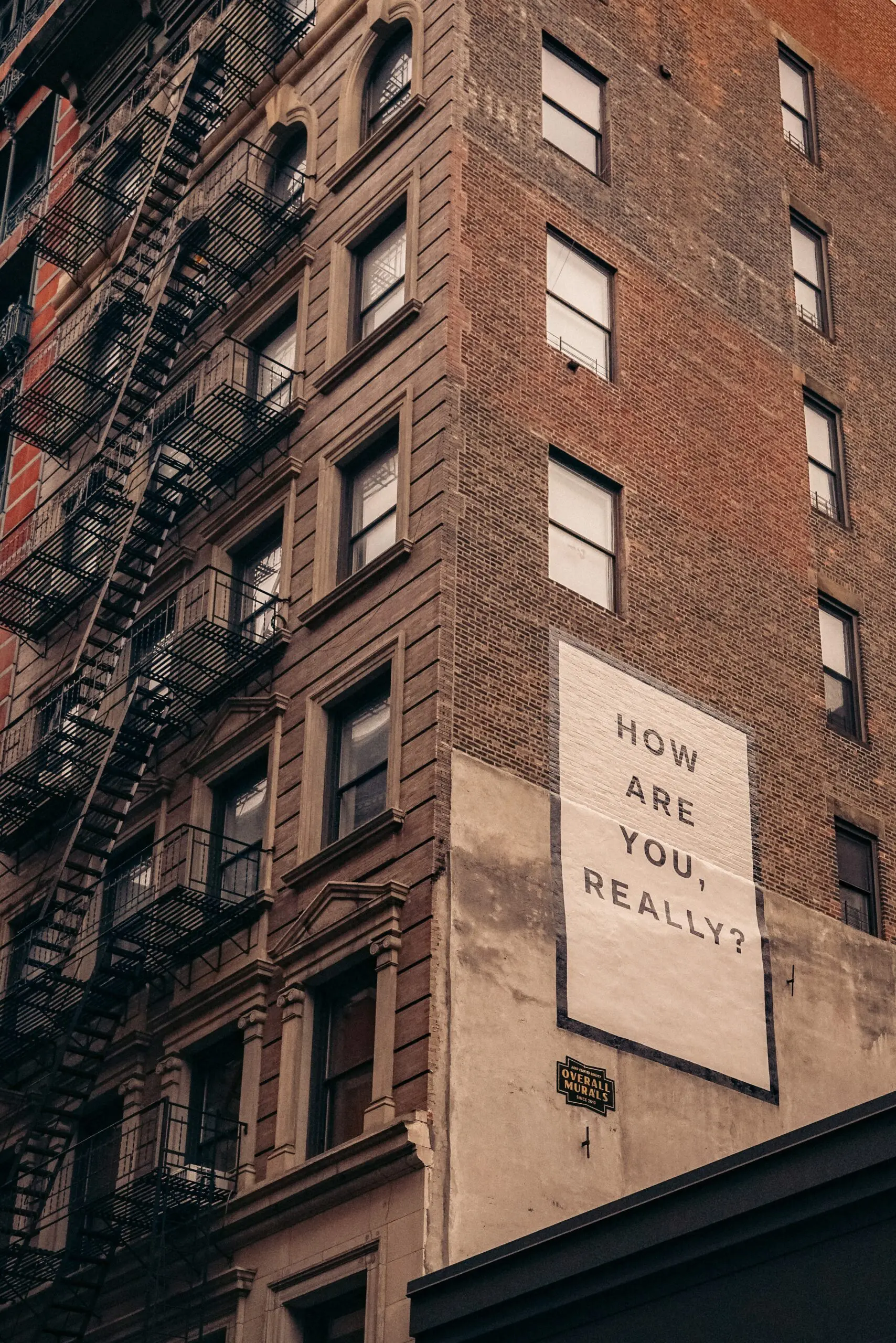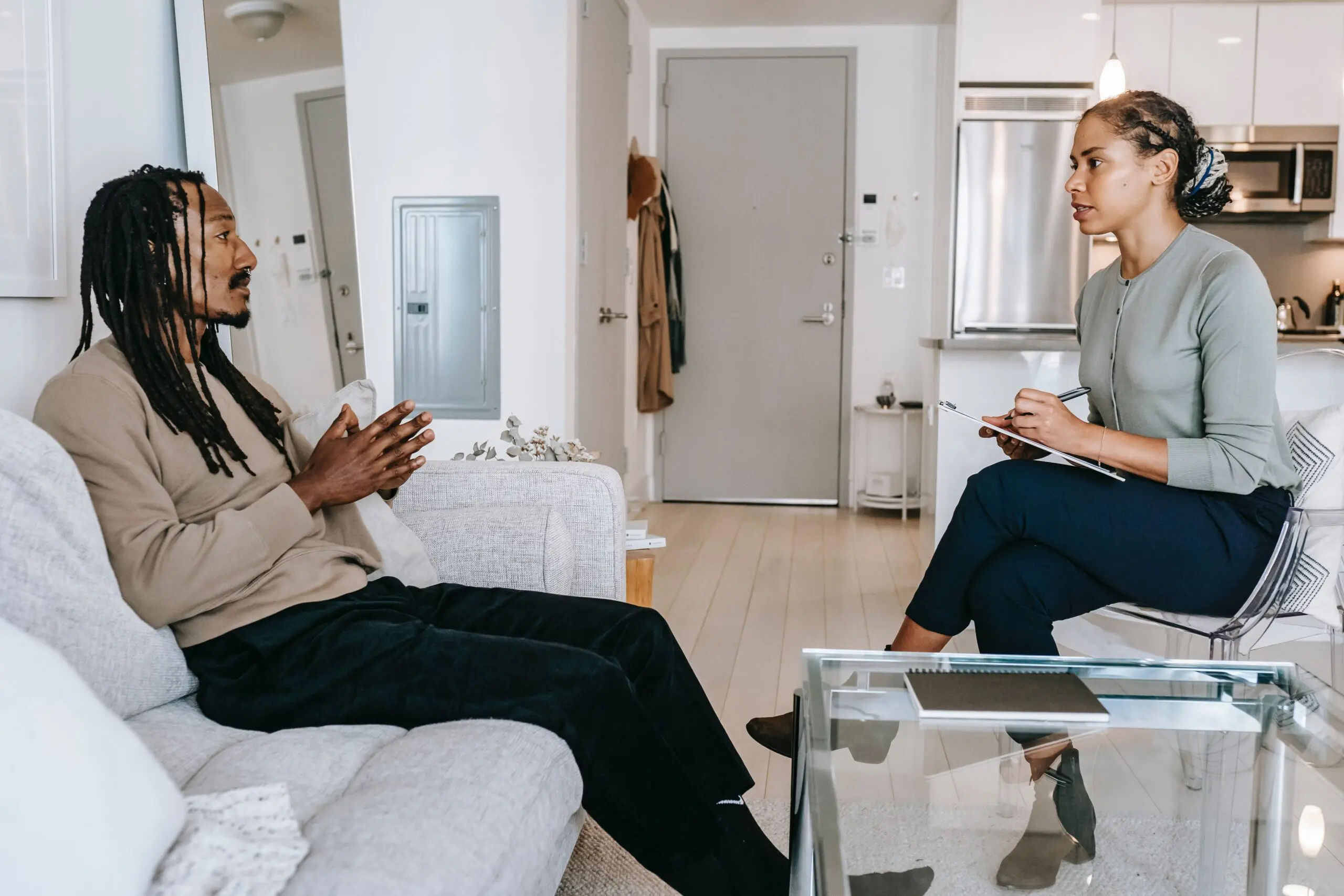An honest conversation about our mental health
Every year we celebrate World Mental Health Day on the 10th of October. The theme for 2023, as set by the World Foundation of Mental Health is “Mental Health is a universal human right.” Two of our employees Michael and Fanni sit down to discuss their own mental health.
Every year, we celebrate World Mental Health Day on the 10th of October. The theme for 2023, as set by the World Foundation of Mental Health, is “Mental Health is a universal human right.”
World Mental Health Day is a fantastic opportunity to start conversations about mental health to break down barriers and stigma around mental health.
We’ve previously interviewed some of our colleagues about how they’ve dealt with mental ill health. To continue this tradition, Michael Shaftoe, Client Success Manager and Fanni Breczku, Head of Marketing, sat down to discuss how they’ve been looking after their mental health and how Reason Digital looked after them.
The conversation has been edited for clarity. The opinions expressed in this blog are of the employee’s own and are not associated with Reason Digital.
Michael Shaftoe
The biggest reason that I thought it would be good to talk about my mental health is because I’ve never actually done anything like this before. I’ve never had any major struggles with my mental health until recently. I have had friends who have struggled with certain mental health conditions for their whole lives. So, it’s something that I’ve been aware of, but I don’t think it massively impacted me until COVID. Being an extrovert and enjoying having a social life and being with friends was something I missed a lot, and it had a very negative impact on me.
Initially, I think being isolated from that was the first time I’d really had a major spike in negative mental health, but it never really stopped me from getting on with my daily life and work life. It wasn’t until my Dad got sick that things got really tough. Dealing with the impact of his terminal illness, especially a close family member like a parent who need a lot of extra care, became extremely difficult. This impacted my mental health significantly to the point where I thought I had a physical illness because the physical impact it had on me was so severe that I couldn’t get out of bed. Some days, I could barely open my eyes.
It was a real struggle. I’m in my late 30s now. It’s one of those things that I’d always imagined if it was going to be a problem, it would be something I would have met earlier. With that level of stress, anxiety, and depression, I really started to see how much they can impact your life day-to-day and how much they can prevent you from just getting on with your day-to-day life. It’s been it’s been a real struggle.
And I think there are a lot of things you can do to enact positive change. But I think having a support network is the most essential thing which I’ve been lucky to have on a personal level, but also with work as well; work has been so supportive. More supportive than I could have ever imagined or ever asked for, which was hugely important to me throughout that really challenging time.


Struggling with mental health at work
My uncle passed away from cancer last year. A few months later, my grandmother died from Alzheimer’s, then my Dad was diagnosed with the same type of cancer that his brother died of only a few months before; and we thought we’d have 6 to 18 months with my Dad, but we only got 5 (months). I found out that my Dad had terminal cancer a week before I started working at Reason Digital. On my first day, it was already hanging over my head.
I knew that it was something that I had to raise, but I was a bit nervous about even talking about it in the first place. But I think having seen what the company does with regards to mental health and how open they are, I think that was the thing that made me think, you know what? It’s essential that I have an open conversation so they understand where I’m at and what’s going on with me on a personal level because I didn’t want it to negatively affect my work in any way.
It was a conversation. Nothing was imposed upon me in any way. It was a conversation about – what do you need as a person.
And obviously, there’s always going to be business needs, but the pressure of the business needs was never really put on me at all. It was, ‘How can we help you?’, which was amazing.
I really struggled even to articulate what I needed. I was lost, and my brain just wasn’t working in the way that it would typically work for me. I felt unable even to say what was needed to get me into a better headspace so that I could get back to work and just the amount of care and consideration that the team took was so overwhelming (in a positive way). Everyone was so kind and so compassionate. I was given as much space and as much support as I needed, and that made such an enormous difference.
I think given that Reason Digital was very upfront with mental health support, and they show a real keen awareness of how that can impact people at work, coming into the business and being made aware of the fact that this is something they take seriously made me feel like I was able to have that conversation. In the past, when I’ve struggled with my mental health, it’s always just been something where I just decide I’ll just push through it. But I think sometimes when you hit that point of capacity where you can’t take any more, I reached a breaking point, and I could feel myself break. Having the space and support to go away and try and put myself back together again was just what I needed, and I feel so privileged to be in a situation where I had that level of support.
The whole time I was off, I had regular check-ins with Ben (editor note Ben White, Managing Director), who was so supportive. This wasn’t something that I felt was difficult to discuss with him because it was an ongoing conversation the entire time, and I think that’s the key, isn’t it? I think being in an environment, whether that’s a personal or a professional environment, where there’s open dialogue and where you feel as though you’re able to have that open discussion without any kind of concern about the implications on how that might affect you.
I think that’s really the most important thing, and I think that’s helped me get myself into a better headspace and why I started therapy recently.
Jack (editor note: Jack Broadley – Financial Controller) helped organise for me, which was lovely of him. I think having colleagues like that, who give you those little bits of extra help when you need it, is so important.

Mental health now
What it’s made me realise is my mental health is a journey. There are going to be difficulties and I don’t think for one second that I’m going to get better overnight and everything’s going to be fine. Dealing with anxiety has been a real shock for me. Dealing with the physical, mental and emotional impact that anxiety has on you isn’t easy. It can spike at any time. When I think about the last couple of weeks in the media, particularly identifying as a queer person, some of the horrible things that are happening in the government now and the impact that it’s having on the rights of trans people in the UK. Many of my friends are trans, my partner is nonbinary. That has really created a big spike in mental health struggles again, meaning I’m struggling to control my anxiety and depression once again. My queer family is very important to me, and I rely on them more than I do my biological family, just in terms of lifting me up, making me feel better. I think something that’s impacting everyone like that is really challenging. It really hurts and it does trigger some quite negative mental health moments.
I imagine it like a backpack where new issues and struggles add to that backpack when they arise. And then there comes a point where it's just back breaking and you can't carry it anymore.
And I feel like the last year or so has been like that for me. I just got to the point where I thought, I don’t know if I can take any more of this. This is just too much to carry.
However, I can rely on and lean on people in my personal and professional life, and I feel so lucky that I have that because some people don’t, which is another reason that I wanted to talk about it because I’ve noticed a lot of men, in particular, don’t like talking about their mental health.
Facing the stigma head-on
I think there’s been a stigma around mental health for years, this kind of British stiff upper lip thing where people don’t want to talk about it, and that’s absolute nonsense. I think everybody needs to think about it, to have people who they can talk to. This was a big reason for speaking up about this. So, people know that if they are struggling with anything, I’m a person they can come and talk to if they need to.
I’m quite hard on myself, and before I’d encountered any serious mental health issues, I was extremely socially confident, and didn’t really suffer with any major anxiety. I think getting into a space where that became a massive challenge for me felt so jarring to someone who was so confident before. So, it’s important to note that it can happen to anyone, I guess—even people who appear to be very confident.
I didn’t feel like I was myself anymore, so I really struggled to access things to help me as I think I was in some denial. Recently when I started therapy, my therapist suggested getting some fidget toys, which I’ve picked up and found quite helpful to use as a bit of a distraction when I’m feeling stressed or anxious.
The thing that helps the most is just talking about it. I think a lot of people don’t feel able to talk, or they’re not comfortable or confident to talk about it. But I think one of the important things that I would say if I were to give anyone any advice would be not to leave it until that backpack is too full to be able to carry anymore because I think that’s when you reach breaking point, like I did earlier this year. And I never want to reach that kind of breaking point again. So, I think keeping open a conversation is essential, whether that’s with someone you care about, a therapist, a free resource like Samaritans or even a total stranger.
That’s something that I need to get better at – speaking up when I need help. If you are that person who tries to handle everything alone, and you’re not managing, if you feel like a let-down or feel like you’ve failed, just challenge those thoughts by talking to someone about it.
Realistically speaking, sometimes things are going to be tough. I need to work on being kind to myself, which is an important thing for everyone to think about.

Fanni Breczku
My mental health, as Michael it, ‘s not something that I’ve struggled with until it got to a point where I felt like if I don’t get help, I’m going to have physical problems as well.
I initially started therapy in 2021, just after I lost my granddad to COVID and that was the first time I felt that everything got to be too much. I needed someone else to talk to because even though I have a super supportive long-term partner, I feel like sometimes, when you can talk to an almost stranger, it’s a bit liberating. There’s no bias. Through therapy, I have learnt a lot about myself and why I approach problems/questions in a certain way. It has helped me understand myself, and I have been able to work on myself, my shame and my shortcomings.
I also wanted to say: thank you to Michael for having this conversation with me.
Struggling with mental health at work
This year, the topic of World Mental Health is Mental Health is a universal human right. I keep thinking about how lucky I am that I’ve been able to access help and also get help from the company that we work for. It’s been major. I haven’t really worked in a place before where. Mental health days are a thing, but also, when I’ve told my managers about having to go home because my grandma had a stroke and subsequently passed away, they, in a no-questions-asked manner, let me take as much time off as possible.
And when I returned to work, they weren’t like: ‘When are you coming back? You’ve already taken X number of days off’.
I didn’t feel like there was an expectation regarding my time off, and they let me get back into my day-to-day routine at my own pace. Everybody was so lovely and understanding, and I’ve got a lot of support in my work but also support as a human to human.
Other than really sounding like we are making an ad for the company we work for, I don’t think I’ve been to anywhere where there was such an awareness of mental health and understanding that different sort of problems manifests differently for individuals and that there is no one-size-fit solution.
Other than just being able to talk to the mental health first aiders, there are other resources available to us and whether that is something that we actively choose to do, like the Mental Health Awareness for Managers training with it together a couple of weeks ago or using like a Perkbox for therapy.
I think it takes a lot of bravery to come to your employer and say: “I'm struggling. I can't do my 100% today, but because even 10% feels too much.” It takes a lot of energy from the struggling person's side to come forward.



Managing mental health daily
Since I started going to therapy, I’ve also been diagnosed with severe anxiety. Things that have been happening in the UK and abroad in the last few days and weeks have really triggered my anxiety as well. I am thinking about our position as members of the LGBTQ+ community of what our future in (my chosen) country is severely impacting on my mental health as well.
And even though I would say now I’m in a good space mentally, these things come unexpectedly and, like dominoes, start the process of spiralling. Even though I feel like I’m not struggling with my grief anymore or my anxiety, like the announcements that the government keeps making, I’m thrust back into those dark spaces.
I also want to just like signpost people who might be reading this to that.
I know it’s extremely hard to speak up, but it’s worth it by talking to your friends or colleagues or even reaching out to a charity. MIND, for example, where you can talk to people who show you that you are not alone in a situation like this.
I do think I’m privileged and more privileged maybe than others that I work in a company that’s supportive. I can afford private therapy; I have incredibly supportive friends, and I know that’s not the case for everyone I’m hoping that by speaking up and talking about it, we can reach a point where people are at least more comfortable reaching out to the level of support they can access.
Even if I remove the professional help that I’ve been getting from the equation, I’ve done a lot of sorts of mindfulness exercises that have worked for me and help me calm down my anxiety.
Last January onwards, I have been doing a lot of puzzles and listening to podcasts, and that way, my mind was occupied, and my brain was occupied with sounds and a task at hand. And when I was in that little cocoon of doing that, I could feel better. And as time went on, I started to process whatever I needed to process, and I recognised that I was puzzling less and listening to my podcasts less as I was getting better, and nowadays, I’m still in the middle of a puzzle now, but
now, I also have a dog that I can just walk and go outside and take a take break if I need to.
Practising self-compassion is especially important. Not being as hard on yourself as you would be otherwise and getting to a point where you can say I am not OK. I need help. I’m overwhelmed if it’s hard, and it does require a bit of bravery but also just being nice to yourself.
If you are struggling with your mental health, you can reach out to the following organisations for help:
MIND or call 0300 123 3393
Samaritans or call 116 123 for 24/7 help
SHOUT – Text ‘shout’ to 85258 for 24/7 help
CALM (Campaign Against Living Miserably) 0800 58 58 58 (open from 5pm to midnight)
Local NHS Mental Health Helpline for England
